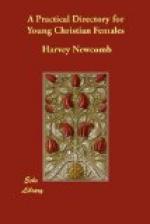adopted; and a bearing fruit upward, or the exercise
of those principles, in holy affections and corresponding
outward conduct. Again, “Israel shall blossom
and bud, and fill the face of the world with fruit.”
The bud and blossom represent, in a very striking
manner, the first exercises of Christian experience.
However, this may be easily counterfeited. Every
tree bears a multitude of false blossoms, which, by
the superficial observer, may not be distinguished
from the true. They may for a time appear even
more gay and beautiful. As it appears in full
bloom, it would be impossible for the keenest eye
to discover them. But as soon as the season arrives
for the fruit to begin to grow, these fair blossoms
are withered and gone, and nothing remains but a dry
and wilted stem. But the real children of God
shall not only bud and blossom, but they shall “fill
the face of the world with fruit.”
In the Song of Solomon, the church is compared to “an
orchard of pomegranates, with pleasant fruits.”
This is a beautiful figure. The pomegranate is
a kind of apple. The tree is low, but spreads
its branches, so that its breadth is greater than its
height. So the true Christian is humble and lowly;
while his good works spread all around him. The
blossoms of this tree are large and beautiful, forming
a cup like a bell. But when the flowers are double,
no fruit follows. So the double-minded hypocrite
brings forth no fruit. The pomegranate apple
is exceedingly beautiful and delicious; and so the
real fruits of Christianity are full of beauty and
loveliness. Again, the church is said to lay
up for Christ all manner of pleasant fruit, new and
old. But, backsliding Israel is called
an empty vine, bringing forth fruit unto himself.
Here we may distinguish between the apparent
good fruits of the hypocrite and those of the real
Christian. The latter does everything for Christ.
He really desires the glory of God, and the advancement
of Christ’s Kingdom; and this is his ruling motive
in all his conduct. But the former, though he
may do many things good in themselves, yet does them
all with selfish motives. His ruling desire is
to gratify himself, and to promote his own honor and
interest, either in this world, or in that which is
to come.
The fruit which his people bring forth is that on which Christ chiefly insists, as a test of Christian character. “Every good tree bringeth forth good fruit; but a corrupt tree bringeth forth evil fruit.” He compares himself to a vine, and his followers to branches; and informs them that every branch which beareth not fruit shall be taken away. In the passage quoted from the first Psalm, the righteous is said to bring forth fruit in his season. And in the 92d Psalm and 14th verse, it is said, “They shall still bring forth fruit in their old age; they shall be fat and flourishing;” thus exhibiting a constancy of fruit-bearing, and an uninterrupted growth, even down to old age.




